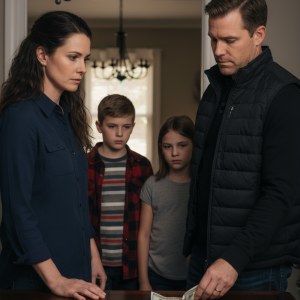“I’m not taking you. There’ll be decent people there—people above your level,” my husband announced, still smoothing imaginary lint from his Italian suit. He had no idea the company hosting that event—his company—now belonged to me.
The bedroom mirror threw back our usual contrast: his glossy cufflinks and polished shoes; my quiet gray dress from a no-name shop, pleated and familiar. He glanced over, disappointment flickering.
“Nothing… more decent?” he asked, the way he always did before corporate functions. The words stung like a pin—small, sharp, survivable.
We’d married five years earlier, back when I’d just finished my economics degree and he was a junior manager hungry for a break. As he climbed—senior sales, big clients, bigger ego—he poured money into image: suits, watches, the new car every two years. “Perception is everything,” he loved to say. Meanwhile I kept my job at a small consulting firm and tried to take up as little financial space as possible. At functions he’d introduce me with a smirk: “My little gray mouse out for some fresh air.”
Over time, the arrogance spread. He sneered at products his team sold—“junk anyone will buy if you shine it up”—and dropped hints about “personal bonuses” from clients. I heard enough to understand and chose, for a while, not to look closer.
Everything shifted three months ago when a notary called: my father—absent since I was seven—had died and named me sole heir. I walked into that office expecting little and walked out owning an investment fund spread across dozens of companies, apartments in the city, a country house—and a controlling interest in a name that froze me mid-breath: TradeInvest, where my husband worked.
I told Dmitry only that I’d “changed jobs” into investments. He barely looked up, hoping my salary wouldn’t drop. Meanwhile, I dived into the fund—numbers, reports, board minutes—and for the first time felt my work matter.
TradeInvest got my closest attention. I asked CEO Mikhail Petrovich Kuznetsov for a frank briefing. He didn’t sugarcoat it: sales volume looked good on paper, profits didn’t; one senior manager—Dmitry Andreev—generated high turnover with suspiciously thin margins and several loss-making deals. “We have concerns,” he said, “but we need proof.” I authorized an internal audit without revealing why that name mattered to me.
A month later, the investigation landed with receipts: kickbacks, “special pricing” for personal cuts, and a money trail to match. While the case built quietly, I upgraded my wardrobe—still understated, now impeccably cut. Dmitry never noticed. To him, anything not screaming designer was “gray.”
“Big corporate dinner tomorrow,” he announced the night before. “Top management. People who decide my future.” Then, kindly as a slap: “You lower my status, Anya. Please don’t come.”
The next evening I arrived at one of the city’s best restaurants in a dark-blue Dior that didn’t boast— it whispered. Mikhail greeted me at the door. “Anna Sergeevna, delighted. You look wonderful.” Inside, the room glowed with executives and department heads who already knew: the fund had a new majority owner, and she was here.
Dmitry strode in later, crisp suit and fresh haircut. Our eyes met. Confusion flickered, then anger. He marched over. “Leave. You don’t belong here,” he muttered. “Don’t embarrass me with your… costume.” Faces turned. He pasted on a smile. “We’ll talk at home.”
Mikhail joined us, genial as ever. “Dmitry, I see you’ve met the owner—we’re honored to have Anna Sergeevna with us.” The word landed like a gavel. Owner. Color drained from Dmitry’s face.
“Owner?” he croaked. Mikhail explained my majority stake and role. Dmitry’s panic was almost tender—pleading where contempt had lived. “Anya, we should talk.”
“Later,” I said. “First, the reports.”
He shook through the next two hours. Afterward, he pulled me aside with a rush of half-denials. “It’s not what you think—I can explain—” His new humility felt cheaper than the arrogance that came before it.
“Dima,” I said quietly, “you can exit the company—and my life—quietly and with dignity. Think.”
He chose the opposite—raised voice, wild accusations, a scene. Security escorted him out at Mikhail’s nod.
At home, the storm continued. He ranted, paced, declared nothing could be proven. I told him the audit started two months ago—before he knew who I was to TradeInvest. Documents, recorded client calls, bank trails—the file had already gone to the authorities.
He collapsed into an armchair. “You can’t do this,” he whispered. I explained the best path was voluntary resignation and restitution—apartment and car included. He sputtered, “Where will we live?”
“I have an apartment downtown,” I said. “Two hundred square meters. And a house just outside the city. The driver is waiting.”
He stared like I’d switched languages. That morning he’d decided I wasn’t fit to stand beside him. That night he learned I’d been standing above the whole time.
“You were right about different levels,” I told him at the door. “Just not the way you thought.” I left without looking back.
In the back seat of the black sedan, the city looked new—not because it had changed, but because I had. His call flashed. Then a text: Anya, forgive me. We can fix this. I love you. I deleted it.
Tomorrow I’d meet with counsel about the fund, the company, the rest of what my father left. A future built on my choices, not someone else’s opinions. Dmitry would be part of the past—with the smallness, doubts, and names meant to shrink me.
I was never a little gray mouse. I was simply quiet while I learned the numbers—and then I owned the room.





